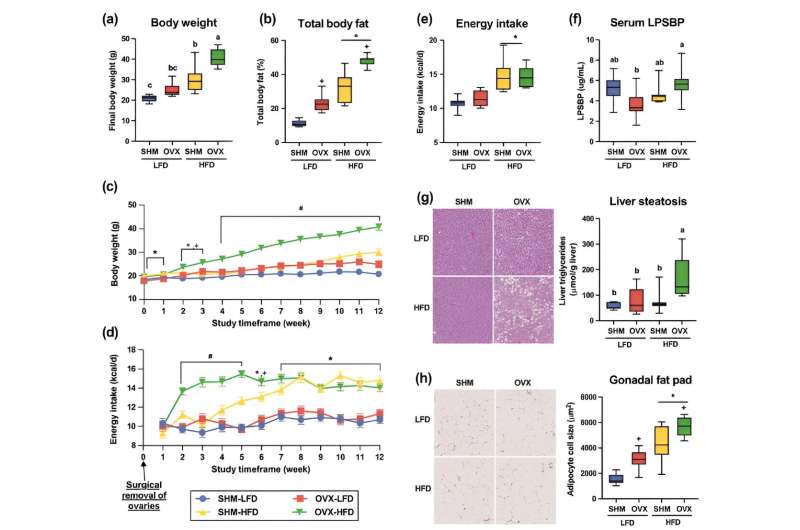This article has been reviewed according to Science X's editorial process and policies. Editors have highlighted the following attributes while ensuring the content's credibility:
fact-checked
trusted source
proofread
Mice study suggests metabolic diseases may be driven by gut microbiome, loss of ovarian hormones

The gut microbiome interacts with the loss of female sex hormones to exacerbate metabolic disease, including weight gain, fat in the liver and the expression of genes linked with inflammation, researchers found in a new rodent study.
The findings, published in the journal Gut Microbes, may shed light on why women are at significantly greater risk of metabolic diseases such as obesity and type 2 diabetes after menopause, when ovarian production of female sex hormones diminishes.
"Collectively, the findings demonstrate that removal of the ovaries and female hormones led to increased permeability and inflammation of the gut and metabolic organs, and the high-fat diet exacerbated these conditions," said Kelly S. Swanson, the director of the Division of Nutritional Sciences and the Kraft Heinz Endowed Professor in Human Nutrition at the University of Illinois Urbana-Champaign who is a corresponding author of the paper. "The results indicated that the gut microbiome responds to changes in female hormones and worsens metabolic dysfunction."
"This is the first time it has been shown that the response of microbiome to the loss of ovarian hormone production can increase metabolic dysfunction," said first author Tzu-Wen L. Cross, a professor of nutrition science and the director of the Gnotobiotic Animal Facility at Purdue University. Cross was a doctoral student at the U. of I. when she began the research.
"The gut microbiome is sensitive to sex hormone changes and can further impact the risk of disease development," she added.
Cross said early microbiome research, beginning around 2005, looked at how the microbiome contributes to obesity development, but most of those studies focused on males.
"Metabolic dysfunction that is driven by the loss of ovarian-function in menopausal women—and how much the gut microbiome contributes to that— has not been studied. The etiology is clearly very complex, but those gut-microbiome related factors are certainly components that we speculated play a role," she said.
The scientists created diet-induced obesity in female mice and simulated the loss of female sex hormones by removing the ovaries in half of the population to examine any metabolic and inflammatory changes, including those to enzymes in the gut. The diets for both groups of mice were identical except for the proportion of fat, which constituted 60% or 10% of calories for those in the high-fat and low-fat groups, respectively.
In the second leg of the study, fecal samples were harvested from mice with or without ovaries and implanted in germ-free mice to study the impact on weight gain and metabolic and inflammatory activity in the gut, liver and fat tissue.
"The mice that were recipients of the gut microbiome of ovariectomized mice gained more weight and fat mass, and they had greater expression of genes in the liver associated with inflammation, obesity, type 2 diabetes, fatty liver disease and atherosclerosis compared with those in the control group," Swanson said.
In assessing the severity of fatty tissue and triglyceride concentrations in the liver, the scientists found that the triglyceride levels were significantly higher and fatty deposits in the liver and groin were greater in the mice that consumed the high-fat diet compared with all other treatment groups, according to the study.
Those on the high-fat diet and those without ovaries had significantly larger fat cells, which are associated with cell death and the infiltration of macrophages—a type of white blood cell that destroys dead cells and microorganisms and secretes pro-inflammatory proteins. Along with elevated expression of the genes associated with inflammation and macrophage markers, these mice had lower expression of genes that are involved with glucose and lipid metabolism.
In the donor mice without ovaries that consumed the low-fat diet, the scientists found increased levels of beta-glucuronidase, an enzyme produced by the colon and some intestinal bacteria that breaks down and recycles steroidal metabolites such as estrogen and various toxins, including carcinogens.
The scientists also examined the expression of genes coding for tight-junction proteins, which affect cell membranes' permeability. They found that the mice without ovaries and those fed the high-fat diet had lower levels of these proteins in the liver and colon, which suggested their gut barriers were more permeable, compromised by either their diet or the absence of female hormones.
In the livers of the recipient mice that received transplants from donors without ovaries, the scientists found elevated expression levels of the gene for arginase-1, which plays a critical role in the elimination of nitrogenous waste. High levels of this protein have been associated with cardiovascular problems such as hypertension and atherosclerosis, according to the study.
More information: Tzu-Wen L. Cross et al, Gut microbiome responds to alteration in female sex hormone status and exacerbates metabolic dysfunction, Gut Microbes (2023). DOI: 10.1080/19490976.2023.2295429





















